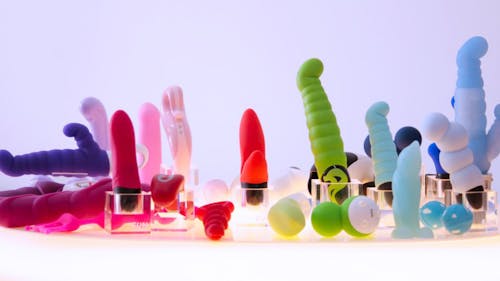Being safe is sexy: Purchasing sex toys 101

Quarantine has taught us all new things about ourselves — and for some, it’s been a new opportunity to explore their sexuality with all this time alone.
Unfortunately, our society’s puritanical attitudes about sex and sexuality can make it hard to talk about sex toys, making it harder to know how to do things safely. The last thing you want when looking for some “me” time is to find yourself with a new bacterial infection or something worse!
To keep that from happening, here are some tips that will help make sure your sensual fun is safe.
Check the material of your toys before purchasing
This might surprise you, but there aren’t a lot of regulations on the kinds of materials that are safe to go in, out or on the human body! There also isn’t enough information out there that confirms exactly what is unsafe and what unsafe effects it may have on you if you use it.
When it comes to penetrative toys, you should always avoid porous items — this means that the material has tiny holes that may not even be visible to the human eye but are capable of storing and growing bacteria. As much as you clean it, the material will still attract bacteria. Yikes!
The safest, nonporous materials in toys are silicone, wood, glass, metal and ABS plastic. If you’re like me, you’re probably a bit intimidated by the concept of wood or glass inside of your body — so for beginners, I recommend that you stick to silicone!
What about the materials you should avoid? The list is long: TPR, TPE, PVC, FantaFlesh, CyberSkin and “jelly” sex toys are all porous materials that might leave you with an infection. Worse, these are materials that also degrade over time — you definitely don’t want this in or on your body!
Unfortunately, these materials are popularly used for sex toys, and most websites that sell items made out of these materials will not label them as dangerous — in fact, they’ll probably mark them as body-safe. Don’t be fooled!
The other material that should possibly be avoided is latex if you have a latex allergy. (If you’re able to safely use latex condoms, and you don’t have a reaction to them, you should be fine with latex toys, but make sure you know your body.)
Using the right kind of lube
I’m a huge advocate of lube because it makes sex, whether it’s penetrative or non-penetrative, way more comfortable. (Side note: I hope you all know there’s absolutely no shame in using lube! A lot of people assume that people with vaginas specifically don’t “need” lube, which is totally untrue! If you’re experiencing pain during sex due to dryness, it’ll help a lot — thank me later.)
But the kind of lube you’re using can affect the safety of your sex toys. In my last article, I touched on what kind of lube should be used on what kind of sex toys. The safest bet is generally water-based lube because it’s less likely to break down the materials of your toys. Think twice before you buy silicone or oil-based lube — and make sure to check what kind of material your toys are first.
It’s better to splurge than to save!
Listen, I know it might sound weird that I’m telling you to spend a bunch of money on dildos and vibrators and masturbators. I’m not saying you should use up your life’s savings on a state-of-the-art sex toy, but the truth is that it’s better for you to spend a hefty price on a safe sex toy than to skimp out and buy a cheap one.
For those of us that don’t have a ton of money, that sucks to hear. Thankfully, you can get body-safe, reliable vibrators pretty easily, since most of them are made out of silicone and available from plenty of vendors like Amazon, or even the local drug store!
When it comes to penetrative toys or masturbators, which are more likely to come in questionable materials and quality, it’s better to save up to purchase something from a reputable company, even if your budget has to be adjusted. I recommend budgeting at least $50 for toys of that kind — and that’s on the cheaper end.
Don’t forget, you can always wait for things to go on sale or buy toys in bundles with your friends!
Take good care of your toys
Last but not least, once you do acquire these fun and exciting new companions, you absolutely must take good care of them. It might be a bit of a buzzkill, but every time you’re done using your toys, you should clean them immediately (This is also a good time for you to pee. Peeing before and after sex can help prevent UTIs!).
You don’t want any chances of bacteria collecting on your toys or your lube or any other materials, possibly breaking them down. Generally, using a gentle antibacterial soap or cleanser on your toys and washing with warm water will keep them clean.
As you dry it, leave it in a space that will be free from dust settling and collecting. You should try to store your toys in cloth bags or boxes that will keep them clean — and they might also help make things a bit more discreet.
Of course, when purchasing toys you should pay attention to any particular care instructions. Most toys can be maintained by gentle cleaning, as I described above, but depending on the material and type of toy, the manufacturer might have special instructions. Always hold onto the instructions they send with your toy — the information is valuable, and sometimes those little slips of paper even include warranty information.
Stay safe and sexy, everyone!



